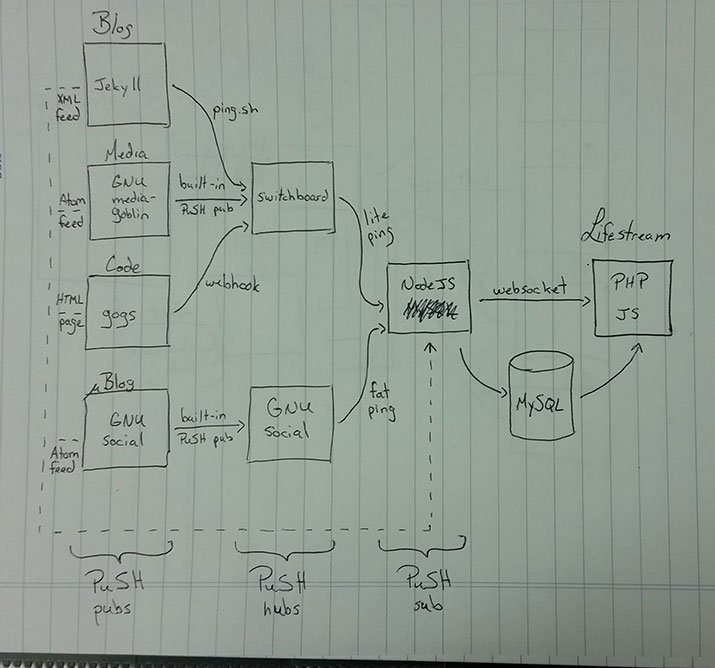Lifestream Architecture
By chimo on (updated on )Recently, the homepage of this blog changed from a static list of recent blog posts to a realtime stream of updates (the list of blog posts is still there, moved to the sidebar). This post tries to document (mostly as a “note-to-self”, again) how this “lifestream” works.
Note: This is a work-in-progress; I’ve already got plans to tweak how some of the pieces fit together.

TL;DR
My sources are PuSH publishers, I have a PuSH hub running on the server, the lifestream is a PuSH subscriber.
Details
For this project, I have three requirements:
- Realtime: I want the updates to appear in realtime. No polling. To acheive this, we rely on the Pubsubhubbub (PuSH) protocol.
- Self-hosted: Everything needs to run on a machine/VM I own/rent (most of this stuff is on a Linode)
- Open Source / Free Software: Everything I run needs to be F(L)OSS
If we refer to the image above, the information flows from left to right, with the exception of the dashed line which we'll talk about a bit later.
Pushing Updates (PuSH publishers)
The Blog
The Blog is the most "manual" source at the moment. It runs on Jekyll and to publish a post, I push to my git repository on my Gogs instance (more information about this setup here).
After the new post has been published, I run a bash one-liner script that pings the PuSH hub:
#!/usr/bin/bash
curl -d hub.mode=publish -d "hub.url=http://chromic.org/feed.xml" http://push.chromic.orgYes, I do plan on automating this at some point.
Media
I run GNU mediagoblin as a media publishing platform. It's PuSH-enabled out-of-the-box so I don't have to do much here. I did, however, modify the Atom Feed generated by gmg so that it includes a direct link to the media file (so that I can include it in the lifestream).
Code
I run Gogs on code.chromic.org. This one is the most hacky-cobbled-together source in the lifestream (so far!). Ultimately, I'd like to have the public activity events pushed to the stream, but right now only "git-push" events are sent over. There are a couple of reasons for this:
- Gogs isn't PuSH-enabled so I need to ping the hub myself
- Gogs is written in Go, which is a compiled language, which means I can't just open files and tweak them. And, I've been too lazy to setup a Go/Gogs development environment so far.
Given this situation, I have to use the features Gogs support out-of-the-book. Luckily, Gogs supports webhooks on git-push events. You can probably see where this is going: I've setup all my repository to execute a PHP script whenever I push code:
<?php
require_once('../../_config.php');
$gogs = $config['gogs'];
$data = file_get_contents('php://input');
// Invalid payload
try {
$json = json_decode($data);
} catch (Exception $e) {
header($_SERVER['SERVER_PROTOCOL'] . ' 400 Bad Request');
exit;
}
// Invalid 'secret'
if ($gogs['secret'] !== $json->secret) {
header($_SERVER['SERVER_PROTOCOL'] . ' 400 Bad Request');
exit;
}
$ch = curl_init($gogs['push']);
curl_setopt($ch, CURLOPT_USERAGENT, 'gogs webhook script');
curl_setopt($ch, CURLOPT_HEADER, false);
curl_setopt($ch, CURLOPT_POST, true);
curl_setopt($ch, CURLOPT_POSTFIELDS, 'hub.mode=publish&hub.url=' . $gogs['topic']);
$ok = curl_exec($ch);
curl_close($ch);
if (!$ok) {
error_log('Could not ping hub (errno: ' . curl_errno($ch) . ')', 4);
error_log('Curl error message: ' . curl_error($ch) ,4);
} else {
error_log('Pinged hub successfully');
}This is also on the "to improve" list.
Microblog
This one is also easy. I use GNU social as a microblogging platform. It's PuSH-enabled out-of-the-box. I don't need to do anything here.
Note: There are a couple of event types that aren't PuSH'ed (e.g.: favorites) by the GNU social platform.
Fm
I added a small curl snippet to
/nixtape/1.x/submissions/1.2/index.php and
/gnukebox/submissions/1.2/index.php to ping the hub
anytime I scrobble anything.
The Hubs
I run an unmodified instance of Switchboard as a PuSH hub. This is where the PuSH publishers send the "ping" whenever they publish something, with the exception of GNU social.
GNU social, in addition to being a PuSH-publisher out-of-the-box, has its own built-in PuSH hub.
The Subscriber
I wrote a quick NodeJS "app" that subscribes to the publishers above through the Switchboard Hub or the GNU social hub. When it recieves notification from the hub that content has been published, it fetches the feed/page it's subscribed to (this is the dashed line in the image above), gets the latest update, parses it and saves the data to a database.
It also notifies the lifestream of new events through websockets.
The Lifestream
Finally, we have the lifestream which is a simple PHP script that gets previously saved events from the MySQL database, and new events through websockets.
Conclusion
I'm planning on adding more sources to the stream as time goes by. Polishing how everything works is also an ongoing activity.